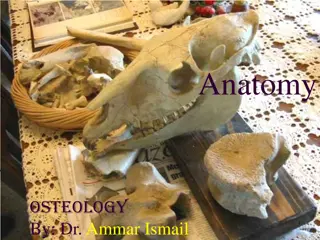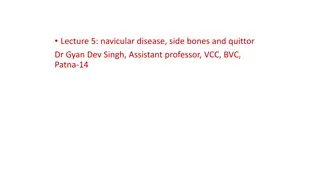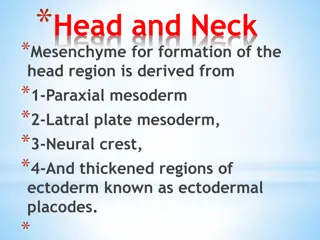Anatomy and Physiology of the Larynx: Overview and Cartilages
Exploring the anatomy and physiology of the larynx, this content discusses the location, movements, and cartilages of the larynx. Details on the unpaired (thyroid, cricoid, epiglottis) and paired (arytenoid, corniculate, cunieform) cartilages are provided, along with their functions and characterist
9 views • 17 slides
Understanding Osteology: An Overview of Bone Structures and Skeleton Composition
Osteology is the study of anatomical structures such as bones, cartilages, and the skeleton that support and protect the body. It includes the classification of bones based on shape and function, details on bones of the thoracic and pelvic limbs, and the divisions of the skeleton into axial, appendi
0 views • 15 slides
Management of Quittor in Equine Medicine
Quittor is a condition in horses characterized by necrosis of lateral cartilage, leading to sinus openings in the coronet region. It can result from infections, pastern region necrosis, or suppuration from neighboring lesions. Symptoms include swollen coronet with sinus openings, potentially leading
0 views • 26 slides
Development of Head and Neck Mesenchyme in Embryonic Formation
The formation of the head and neck region in embryonic development involves mesenchyme derived from paraxial mesoderm, lateral plate mesoderm, neural crest, and ectodermal placodes. Paraxial mesoderm contributes to brain case and muscle formation, while lateral plate mesoderm forms laryngeal cartila
0 views • 34 slides



